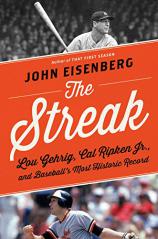The Streak: Lou Gehrig, Cal Ripken Jr., and Baseball's Most Historic Record
Review
The Streak: Lou Gehrig, Cal Ripken Jr., and Baseball's Most Historic Record
We recently marked the 75th anniversary of Lou Gehrig’s famous “Luckiest Man” speech, so it’s only appropriate that fans celebrate his most famous accomplishment --- his consecutive game-playing streak of 2,130 games --- along with that of the man who broke that unbreakable record, Cal Ripken Jr., in John Eisenberg’s THE STREAK.
Gehrig was right when he said he was lucky. There’s a tremendous amount of good fortune involved in being able to play through injuries, illness, fatigue, etc. Eisenberg details all the drama of broken bones, fevers and other situations that might have brought either man’s attempt at sports immortality to a screeching halt.
A number of people in baseball, as well as members of the media, were not necessarily fans of what Gehrig and Ripken were trying to accomplish. They called them selfish for putting personal glory ahead of team success, especially when the ballplayers were slumping and the teams weren’t doing well. It is actually surprising how negative some of these comments could be. But support was there as well; their respective managers would say that their man playing at 50 percent was better than others playing at full strength.
"Eisenberg details all the drama of broken bones, fevers and other situations that might have brought either man’s attempt at sports immortality to a screeching halt."
Most of THE STREAK alternates between Gehrig and Ripken, delving into their athletic backgrounds and mental make-ups in an effort to explain what drove them. Gehrig grew up in poverty in the tenements of New York. He was single-minded in wanting to play every game. Back in his day, if someone was out for any length of time, there was always the possibility that he could lose his job. That’s how Gehrig’s streak began in the first place. Many non-fans know that he replaced Wally Pipp, who was out of the lineup with a headache, and didn’t move off the spot for more than a decade.
Ripken, on the other hand, grew up in a baseball family. His dad was a baseball “lifer” and instilled in him and his brother, Billy --- also a major leaguer and a teammate of Cal for a time --- a strong work ethic.
To be fair, however, it must be noted that Gehrig, Ripken and others who put together long strings of games did not necessarily play every inning of every game. The author points out several instances in which an end-around (to borrow from another sport) was made in the form of a token appearance as a pinch-hitter or by coming out of a game early, having stayed in just long enough to qualify for a continuation of their streak.
One of the more interesting sections compares the accomplishments in an attempt to show who had it tougher. In Gehrig’s era, teams played 154 games, eight fewer than the 162 Ripken had to endure. There were also great differences in travel (train when there were no major league teams west of St. Louis vs. plane across multiple time zones) and even media coverage. Then there was the degree of difficulty on defense; Ripken played a much more demanding position, coming up as a shortstop before moving to third base late in his career, while Gehrig played first base. Even the type of field comes under scrutiny as the author contends that Gehrig had it easier, playing on natural grass rather than the artificial surfaces that took more of a toll on Ripken’s generation.
Of course, we all know what ended Gehrig’s streak --- the disease that would bear his name --- and Eisenberg renders the storyline in heartbreaking fashion. For Ripken, it was also the inevitable march of time when the wear and tear of putting together 2,632 straight games just could not be shunted aside.
Eisenberg offers interstitial chapters of other men who compiled impressive feats and how the media did (or did not) handle the news. Of course, in more recent years, everything is quantifiable, so we learn about Billy Williams (1,117) and Steve Garvey (1,207). And just FYI, Everett Scott, who played for several teams from 1914 to 1926, held the record of 1,307 before Gehrig came along.
Eisenberg wraps up with examples of the paltry numbers today’s players have when it comes to playing in consecutive games (similar to the drastic drop in complete games by pitchers) and why Ripken’s mark may truly be one of the last unbreakable records.
Reviewed by Ron Kaplan on July 21, 2017
The Streak: Lou Gehrig, Cal Ripken Jr., and Baseball's Most Historic Record
- Publication Date: July 4, 2017
- Genres: History, Nonfiction, Sports
- Hardcover: 320 pages
- Publisher: Houghton Mifflin Harcourt
- ISBN-10: 0544107675
- ISBN-13: 9780544107670





